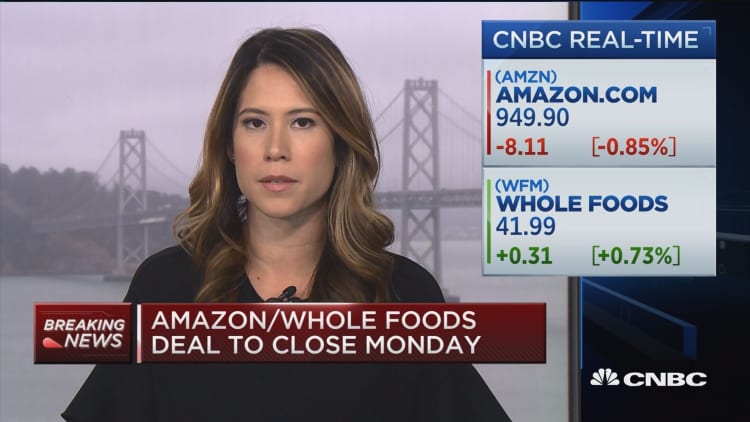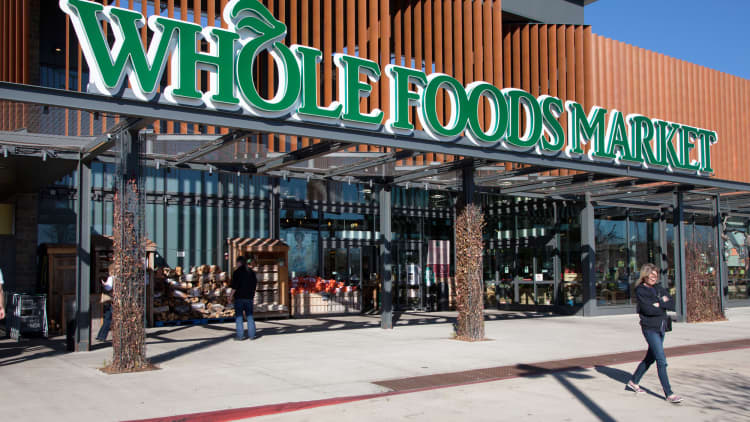
Amazon announced on Thursday that its $13.7 billion acquisition of Whole Foods will close on Monday.
As the two companies work to integrate their business, all customers will immediately see "lower prices on a selection of best-selling staples across [Whole Foods] stores."
And Amazon promises "more to come," as the internet giant begins to integrate Prime into the Whole Foods ecosystem. Eventually, Prime members will receive "special savings and in-store benefits."
Amazon didn't disclose how long that would take, but said it would first need to integrate Amazon Prime into the Whole Foods point-of-sale system. Once complete, the offers will begin and eventually Prime will become Whole Foods' customer rewards program.
Grocery stocks immediately tumbled Thursday afternoon on the news. Shares of Kroger, Costco, Sprouts Farmers and Supervalu were all seen trading at session lows. Big-box retailers Target and Wal-Mart also watched their stocks fall.
Amazon promising immediate price cuts puts pressure on traditional grocers that are already operating in a thin-margin business. Meal-kit businesses, like Blue Apron, have also taken a beating after Amazon announced it would be creating a similar service.
On Wednesday, Whole Foods shareholders voted to advance Amazon's acquisition of the grocery chain, moving the proposal one step closer to reality. Amazon shareholders didn't need to sign off on the deal.
The two parties were saying they expected to finalize their merger during the second half of 2017. Though, a source familiar with the matter told CNBC the deal could happen "sooner rather than later."
Just hours after Wednesday's shareholders vote, the Federal Trade Commission said it would allow the Amazon-Whole Foods deal to proceed. The FTC had been conducting an investigation to gauge whether the merger would decrease competition under federal regulations.
A spokesperson from Amazon told CNBC on Thursday that it has no plans for layoffs or to use automation to replace Whole Foods' cashiers. This was a widely held concern that sparked debate when the acquisition was first announced.
Looking at the future of Whole Foods stores, Amazon said that soon Amazon Lockers will be available in select locations. Using these, shoppers can either have products shipped from Amazon.com to their local Whole Foods, or return items back to Amazon during a trip to the grocer.
Whole Foods' private-label products will also now be available through Amazon.com, AmazonFresh, Prime Pantry and Prime Now. A move like this could put more pressure on competitors on the low-price end of the supermarket spectrum, like Wal-Mart, and German-based Aldi and Lidl.
And this is particularly concerning for those companies, like Sprouts, that operate neck and neck with Whole Foods in organic. Here, prices have tended to be higher than with conventional and nonperishable items.
"The bottom line is that this isn't theory any more," GlobalData Retail Managing Director Neil Saunders told CNBC. "The deal is happening and it will drive change in the grocery sector. Competitors will need to think about what that means for them and respond accordingly."
Among many things, this deal will provide Amazon a much more extensive real estate footprint. However, Amazon is entering the brick-and-mortar world at a time when many are saying the supermarket space is overcrowded.
Some of the bigger names in grocery are already trimming plans for expansion. Kroger, for example, has said it will cut its store openings in 2017 to 55 from 100, opting to invest less in its physical retail and more in digital initiatives. Even Whole Foods had scaled back its own expansion plans prior to Amazon arriving on the scene.
In its press release on Thursday, Amazon didn't mention exactly how it would use Whole Foods' portfolio of more than 450 stores — whether it would keep all locations open, or transform them over time.
Read the full release from Amazon:
Amazon and Whole Foods Market today announced that Amazon's acquisition of Whole Foods Market will close on Monday August 28, 2017, and the two companies will together pursue the vision of making Whole Foods Market's high-quality, natural and organic food affordable for everyone. As a down payment on that vision, Whole Foods Market will offer lower prices starting Monday on a selection of best-selling grocery staples across its stores, with more to come.
In addition, Amazon and Whole Foods Market technology teams will begin to integrate Amazon Prime into the Whole Foods Market point-of-sale system, and when this work is complete, Prime members will receive special savings and in-store benefits. The two companies will invent in additional areas over time, including in merchandising and logistics, to enable lower prices for Whole Foods Market customers.
"We're determined to make healthy and organic food affordable for everyone. Everybody should be able to eat Whole Foods Market quality — we will lower prices without compromising Whole Foods Market's long-held commitment to the highest standards," said Jeff Wilke, CEO of Amazon Worldwide Consumer. "To get started, we're going to lower prices beginning Monday on a selection of best-selling grocery staples, including Whole Trade organic bananas, responsibly-farmed salmon, organic large brown eggs, animal-welfare-rated 85% lean ground beef, and more. And this is just the beginning — we will make Amazon Prime the customer rewards program at Whole Foods Market and continuously lower prices as we invent together. There is significant work and opportunity ahead, and we're thrilled to get started."
"It's been our mission for 39 years at Whole Foods Market to bring the highest quality food to our customers," said John Mackey, Whole Foods Market co-founder and CEO. "By working together with Amazon and integrating in several key areas, we can lower prices and double down on that mission and reach more people with Whole Foods Market's high-quality, natural and organic food. As part of our commitment to quality, we'll continue to expand our efforts to support and promote local products and suppliers. We can't wait to start showing customers what's possible when Whole Foods Market and Amazon innovate together."
Here's what will be new in Whole Foods Market stores on Monday and what customers can expect over time as the two companies integrate:
Starting Monday, Whole Foods Market will offer lower prices on a selection of best-selling staples across its stores, with much more to come. Customers will enjoy lower prices on products like Whole Trade bananas, organic avocados, organic large brown eggs, organic responsibly-farmed salmon and tilapia, organic baby kale and baby lettuce, animal-welfare-rated 85% lean ground beef, creamy and crunchy almond butter, organic Gala and Fuji apples, organic rotisserie chicken, 365 Everyday Value organic butter, and much more.
In the future, after certain technical integration work is complete, Amazon Prime will become Whole Foods Market's customer rewards program, providing Prime members with special savings and other in-store benefits.
Whole Foods Market's healthy and high-quality private label products — including 365 Everyday Value, Whole Foods Market, Whole Paws and Whole Catch — will be available through Amazon.com, AmazonFresh, Prime Pantry and Prime Now.
Amazon Lockers will be available in select Whole Foods Market stores. Customers can have products shipped from Amazon.com to their local Whole Foods Market store for pick up or send returns back to Amazon during a trip to the store.
This is just the beginning — Amazon and Whole Foods Market plan to offer more in-store benefits and lower prices for customers over time as the two companies integrate logistics and point-of-sale and merchandising systems.
— CNBC's Deirdre Bosa and Sarah Whitten contributed to this reporting.
WATCH: Whole Foods shareholders approve Amazon buyout



